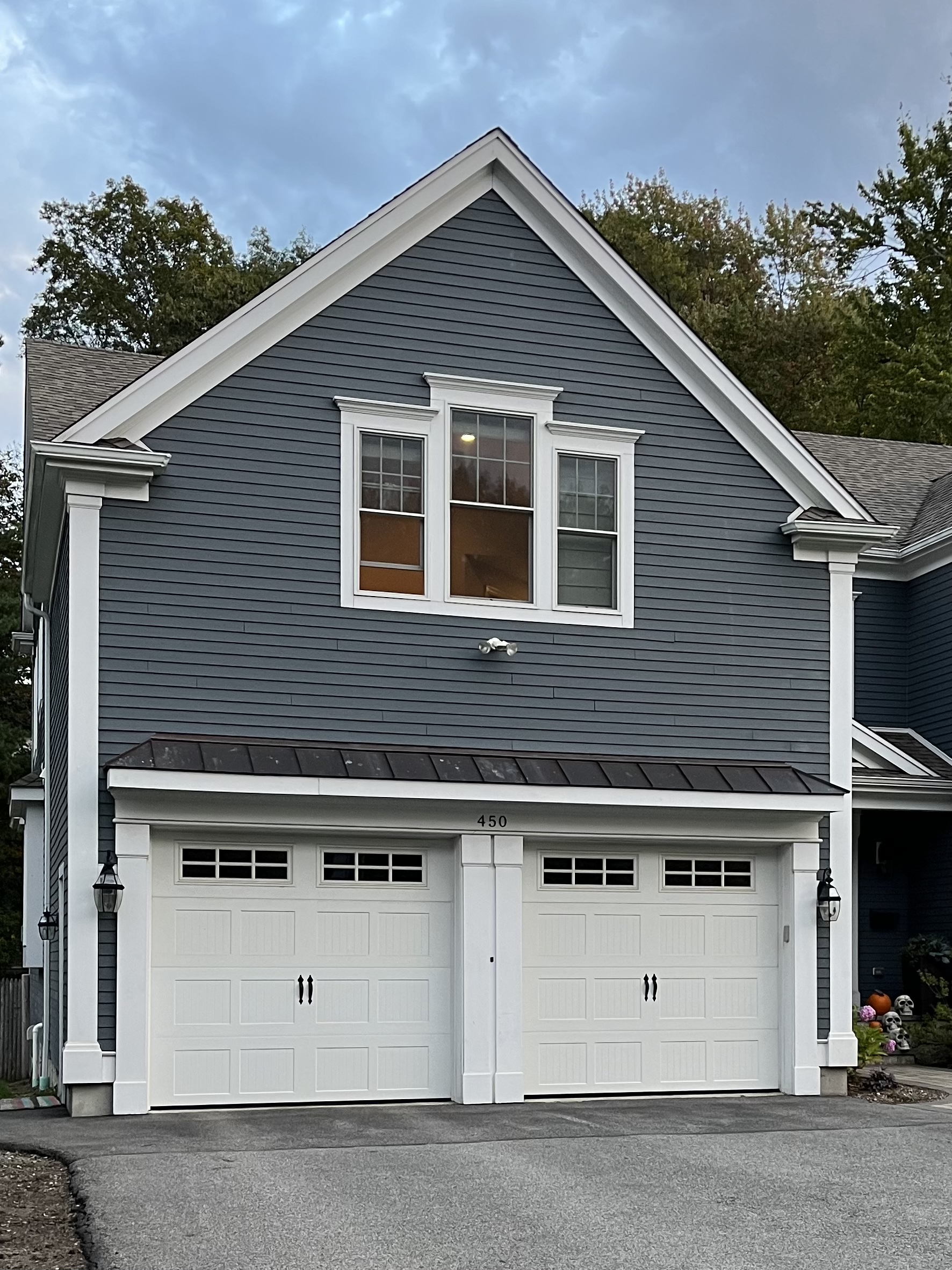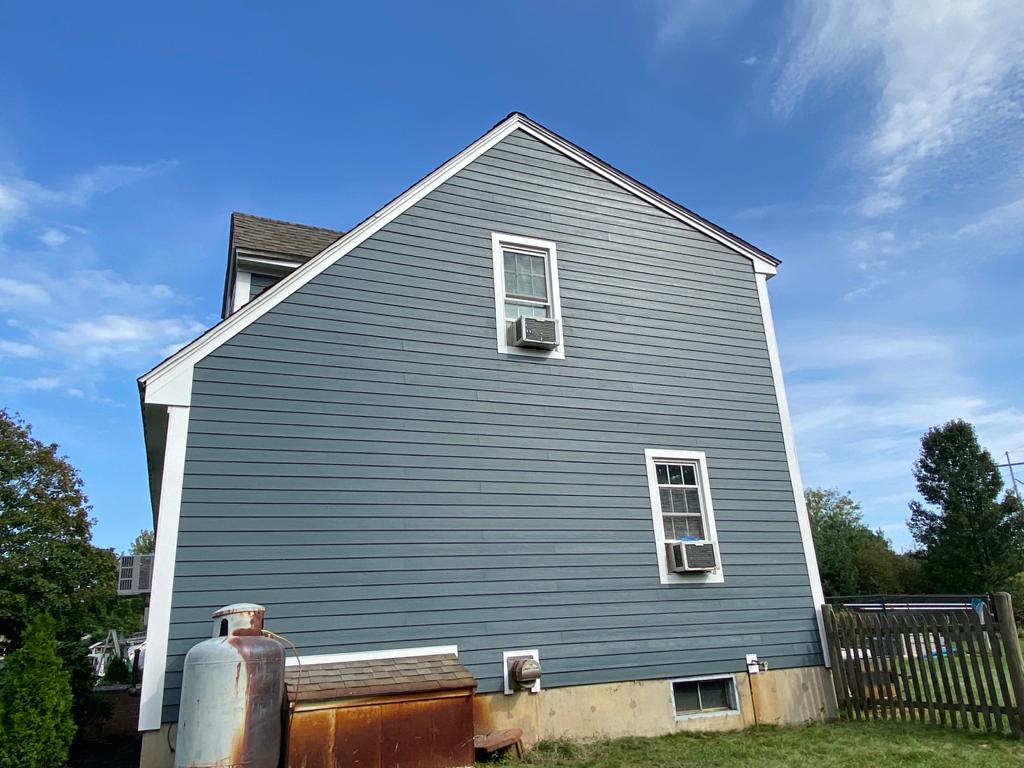Vinyl Siding in Massachusetts: Is It Worth It?
Considering upgrading your home exterior? Vinyl siding is a popular choice for Massachusetts homeowners due to its affordability, durability, and low maintenance. This guide covers cost, benefits, energy-efficient options, and practical tips to help you decide if vinyl siding is the right choice for your home.
What Is Vinyl Siding?
Also known as PVC siding or vinyl exterior, is a durable cladding material designed to protect homes from harsh weather, moisture, and pests. Modern vinyl panels come in a variety of colors and textures, including wood-grain styles, and can be insulated to improve energy efficiency. For homeowners in Massachusetts, PVC siding provides a balance of low maintenance, aesthetic appeal, and long-term performance

Key Benefits of Vinyl Siding for Massachusetts Homes
1. Affordable Exterior Upgrade
One of the main advantages of a vinyl exterior is cost-effectiveness. Compared to fiber cement or wood siding, vinyl is more affordable to purchase and install. Typical vinyl siding cost MA ranges from $5–$12 per square foot, depending on panel quality and installation. For a 2,000 sq. ft. home, total costs generally fall between $10,000–$24,000. Using insulated siding can slightly increase costs but often leads to long-term energy savings.
2. Low Maintenance
Unlike traditional wood siding, PVC siding does not require regular painting or staining. A simple power wash once or twice a year is sufficient to keep it looking clean. This low-maintenance property makes vinyl exterior panels especially suitable for Massachusetts homes that experience harsh winter weather.
3. Weather Resistance
High-quality vinyl panels are designed to withstand Massachusetts winters, including snow, ice, and strong coastal winds. Insulated panels prevent warping and cracking, ensuring your home remains protected throughout the year. Proper installation with flashing and ventilation also helps reduce potential water damage from ice dams or heavy rain.
4. Energy Efficiency
Choosing energy-efficient siding, such as insulated vinyl panels, provides thermal protection, helping to reduce heating costs in winter and improve indoor comfort. Many Massachusetts homeowners find that the investment in energy-saving siding pays off over time in lower utility bills.
5. Aesthetic Versatility
PVC siding is available in a wide range of colors and textures, allowing homeowners to maintain a traditional New England appearance or achieve a modern exterior. With options that mimic wood, stone, or smooth finishes, vinyl siding can suit any architectural style.
Potential Drawbacks of Vinyl Siding
1. Vulnerability to Extreme Weather
While durable, vinyl panels can crack or warp in extreme temperature swings. Selecting thicker panels or insulated options can minimize this risk for Massachusetts homes.
2. Color Fading Over Time
Extended sunlight exposure may cause minor fading, particularly on south-facing walls. UV-protected siding reduces this effect, but some color change may still occur over decades.
3. Shorter Lifespan Compared to Other Materials
Vinyl siding typically lasts 20–40 years, whereas fiber cement or high-quality wood can last 50+ years. Homeowners seeking a longer-term investment should weigh durability against cost savings.
4. Environmental Considerations
PVC siding is made of plastic, which has a larger environmental footprint than natural materials. While recyclable in some areas, it is generally less eco-friendly than wood or fiber cement.
Vinyl Siding Cost MA: What to Expect
Costs depend on:
- Material quality
- Labor
- Old siding removal
- Optional insulation
Insulated panels increase initial investment but improve energy efficiency, comfort, and winter protection, making them an attractive long-term option.
Vinyl Siding Compared to Other Exterior Materials
| Siding Type | Lifespan | Maintenance | Weather Resistance | Pros |
|---|---|---|---|---|
| Vinyl (PVC) | 20–40 yrs | Low | Good | Affordable, low maintenance, energy-efficient options, variety of styles |
| Fiber Cement | 40–50 yrs | Moderate | Excellent | Durable, fire-resistant, withstands MA weather |
| Wood | 30–50 yrs | High | Moderate | Classic appearance, paintable, natural material |
| Aluminum | 30–40 yrs | Low | Moderate | Lightweight, low maintenance, corrosion-resistant |
Maintenance Tips for PVC Siding in Massachusetts
- Power wash once or twice a year.
- Inspect after winter for cracks or warping.
- Trim trees and shrubs near siding.
- Repair or replace damaged panels promptly.
Is it Worth It?
Many homeowners wonder if vinyl siding is worth it. Considering affordability, low maintenance, durability, and energy-efficient options, PVC siding is a practical and attractive choice for Massachusetts homes. While it may not match the lifespan of fiber cement, the overall value, convenience, and winter performance make it a smart investment.
Impact on Home Value
- Enhances curb appeal and resale potential.
- Energy-efficient siding appeals to buyers.
- Modern Vinyl exterior refreshes appearance at a lower cost than brick or stone.
Signs Your Home Might Need it
- Old or damaged siding
- Planning winter energy efficiency upgrades
- Reducing maintenance requirements
- Boosting curb appeal before selling
Conclusion
For Massachusetts homeowners, PVC siding provides a practical, cost-effective, and energy-efficient solution. Insulated panels improve comfort and reduce heating costs, while low-maintenance PVC siding protects the home from harsh winters. Overall, vinyl siding is worth it as a long-term investment in durability, appearance, and home value.
Upgrade your home’s exterior with vinyl siding.
Contact Marine Home Improvement for a free consultation and expert advice on selecting the best siding for your Massachusetts home.
F.A.Q
Is vinyl siding suitable for Massachusetts weather?
Yes. Modern vinyl panels, especially insulated versions, are durable against snow, ice, and temperature fluctuations.
How long does vinyl siding last?
Typically 20–40 years depending on quality and maintenance
Does vinyl siding improve energy efficiency?
Yes. Using energy-efficient siding like insulated vinyl reduces heat loss and lowers heating bills.
How do I maintain vinyl siding in Massachusetts?
Annual power washing, post-winter inspections, trimming vegetation, and prompt repairs keep siding in top shape.
Can vinyl siding be painted?
It can, but painting is usually unnecessary. Special exterior paint is required for PVC siding.
Vinyl siding vs fiber cement—what is better for MA?
Fiber cement lasts longer and resists extreme weather, but vinyl siding is more affordable, low-maintenance, and can include energy-efficient options.
If you'd like to know more about it, check our blog post

Why Choose Marine Home Improvement?
Since 2001, Marine Home Improvement has been a trusted roofing and exterior remodeling specialist serving homeowners across Massachusetts. Our team delivers high-quality roof replacements, durable siding installations, custom decks, and professional window upgrades—always with clear communication and a commitment to excellent workmanship.
We use premium materials from trusted suppliers and provide detailed, transparent estimates so you always know what to expect. With strong warranties on both labor and products, you can feel confident your home is in expert hands.
Our BBB accreditation and consistent 5-star feedback on Facebook and Yelp highlight our dedication to reliability and customer satisfaction. When you choose Marine Home Improvement, you’re choosing quality, honesty, and long-lasting results.
